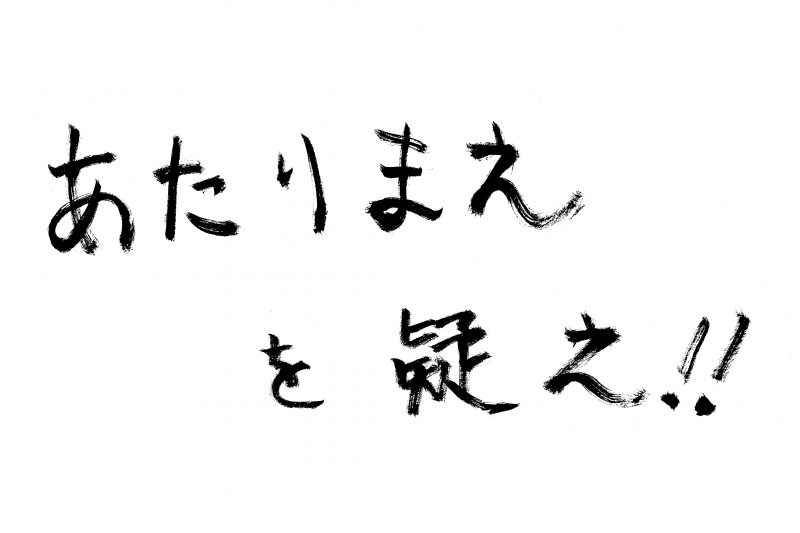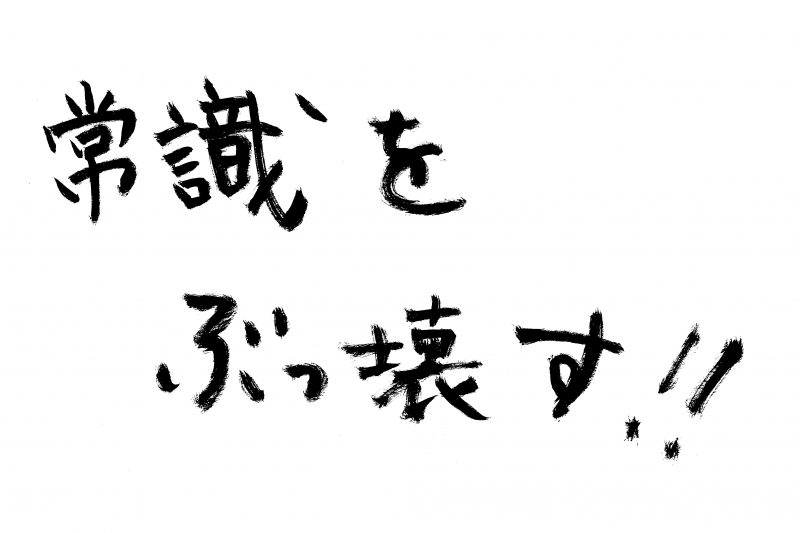niime 百科
Encyclopedia of niime
niime的20分対談
「自然体」について〈後半〉
niime's twenty-minute talk
About a 'natural attitude'
〈part 2〉
「自然体」について〈後半〉
About a 'natural attitude'
〈part 2〉

2019 . 10 . 01
「niime百科」新展開の20分対談、その後半。引き続き、玉木と酒井が自然体についてざっくばらんに自然体で語ります。「自己顕示欲」の話から話題は「子育て環境」へ、そして「義務教育」へと。
玉木「ワクワクする自然体からじゃないと学びってないねんな。はい、今から勉強です!とか言われて詰め込まれるものって脳が拒絶しちゃうから。」
酒井「僕らのやってることも義務じゃないやん。遊び感覚でやってるからさ。」
玉木「結局…自分を良く見せたいって人間の本質としてあるのかな?自然体なのが良いに決まってるじゃないですか。」
― ありのままなら無理がなくてラクですからね。
玉木「うん。無駄な労力は使わない方がいいから。世の中のためにも地球のためにも。」
― ひとつ言えるのは、人に評価してほしいって気持ちってあると思うんですよ。
酒井「あ、まさにそれ。」
玉木「それって、なんで評価してほしいの??」
― それはまぁ、人に評価してほしい…その欲求が強い人っているんでは。
玉木「それって本能??」
酒井「その欲が強いって、まさに自己顕示欲やな。」
玉木「なんでそんな欲が必要なの?」
酒井「なんなんやろうなぁ?人間の欲求的なところなんじゃない?」
玉木「睡眠欲とか食欲とか性欲とか生存するために…」
酒井「三大欲求やな。」
玉木「根本的に必要な欲よりも上位の欲なわけでしょう?それは。」
酒井「上ってゆうよりも…同列なんじゃない?眠くなりゃ寝るし、食いたきゃ食うし、それと一緒で…」
玉木「でもそれは生きるためやん。それがなきゃ死ぬから。」
― 本能的な欲求ですね。
玉木「もう生まれた時から持ってるもので。でも自分を良く見せたいという欲は、たぶん赤ちゃんは持ってないだろうし。自分と他者との比較ってまだしてないでしょう?赤ちゃんが、新生児室で隣に並んでる子より大きな声で泣かなきゃとか、思う??」
酒井「思わん。」
― やっぱり自我が芽生えてからというか。
玉木「人と人のつながり、まぁ、親と子の関係性が出来てきてからか。」
― 親に良く見られたいというのはあるでしょうね。
玉木「親にほめられたい、そこが最初か…でも愛されたいというのは人間皆持ってるんだろうね。」
― ベースはそこなんでしょうね。
玉木「そこだろうね…弱いんだよ人間て。」
酒井「愛されたいっていうのは自分がカワイイんやろな。」
玉木「自分がカワイイことの指標として、どんだけ愛されてるか?とか、どんだけトモダチがいるか?とか、どんだけオカネ持ってるか?とか、そうゆうところを自分で可視化させて、自分の価値を自分で評価して、私大丈夫、と思う、と。」
― モノサシが欲しいと。
酒井「それって自然体じゃないやろ?」
玉木「対ヒト、ってゆうのは仕方ないと思うけど。私も人間一人じゃ生きて行けないと思うから。」
― 自分を愛するって大事だと思うし、愛されたいというのも自然だと思うんですよ。
玉木「それが過度になってるってこと?」
― そうかもしれませんね。
玉木「本当に心通わす仲間がいるとするなら、それ以上は求めずに、その中でちゃんと深めていきたいと思う。でも孤独で寂しい人は確実に増えてると思うねん、今の日本。」
― うーん。
玉木「核家族化が進んで、子育ても、おじいちゃん・おばあちゃんの手には掛かってない子が多いでしょう?そうなると人間の中でもまれて育つということが無いから、対お父さん・お母さん、というそこだけの愛しかないから。なんか愛情を注いでもらうために一方方向しか見てない気がする。」
― 色んな人に囲まれる子供時代を過ごすことがないと。
玉木「それが、おじいちゃんもおばあちゃんも親戚のおばちゃんもいて、いとこも遊びに来るとか休みの日は10人くらい集まってごちゃごちゃとバーベキューしてるとかになれば、お父さん・お母さんだけじゃない色んな大人がいたり友だちがいるから、色んな人間関係のモデルケースを観察しながら、生きていく上での知恵を育んでいくやん。」
― なるほど。
玉木「で、自分で愉しむための方法も色々試せるし。そうゆう環境が減ってるのではと思う。」
― 両親以外の色んな考えや目線に触れる機会が減ってるんでしょうね。
玉木「イエスかノーか、になりやすい気がする。」
― 考え方・感じ方の多様性に触れることが豊かさなのかも。
玉木「聞いた話だけど、昔の小さな子どもだと親が田んぼや畑仕事をする間、木にひもで括られてたりしたんだって。お母さん仕事しよるからここで待っとき!みたいな。ワンちゃんみたいな感じやん?でも託児所なんかないから、それが許されててそれしか方法がなかったろうし。ほったらかしでケガだってしたかもしれないし危険な目に遭ったかもしれないけど、そこを潜り抜けて考える、お母さんを待っとく間に何して遊ぼうか?と自分で考える時間があったと思うし、それで成長したところがあるんだと思うけど、今の時代、どこかに預けないとダメとか、全部決められてるやん。で、もちろん危険性もないかもしれないけど…愉しみがないってゆうか。(酒井に)どうしたらいい?」
酒井「そもそも自然体というものが、ニュートラルやと考えるなら、ニュートラルの崩壊ってゆうのは“義務教育”やろな。」
玉木「義務で教育しちゃいかんのか。」
酒井「そう。小学一年生から義務教育が始まるとして、その時からニュートラルの崩壊が始まってるからさ。」
玉木「もともとは教育こそ人のレベルを上げるための方法やと先人は思って、学校をつくったわけでしょう?」
酒井「結局、人皆それぞれの生活というものがベースにある、その上で色んな学習とかによるコンテンツがあってその人が形成されているわけやし。」
玉木「繋がってんねんな。」
酒井「そうねん。」
玉木「で、ワクワクする自然体からじゃないと学びってないねんな。なんかガチガチに、はい、今から勉強です!とか言われて詰め込まれるものって脳が拒絶しちゃうから。」
酒井「僕らのやってることも義務じゃないやん。」
玉木「遊びから派生してるからね。」
酒井「遊び感覚でやってるからさ。」
― いい話になってきました!
玉木「そうゆう意味では今tamaki niimeとして危機感を感じてるのは、遊び感覚じゃなくなっているところなんですよ。」
― そうなんですか?
酒井「僕らは義務やと思ってないのに、皆んなは義務化されてるよな。」
玉木「私たちは新しくそれを創り出したから、完全に“趣味”ですよ。楽しくてしょうがない。こんなん出来たら面白い、いやこれもオモロイ、ってやって来たけど、それが出来上がってから入ってきた人たちにしてみたら、今の義務教育と一緒なんですよ。こうしなければならない、とか。」
酒井「そんなこと何も言ってないのにな。」
― これまでに囚われ過ぎずに遊び心を大切に…いっそこの「niime百科」も、毎回即興でスタイルを変えても良いのかもしれませんね。
玉木「そう、今日なにする?どうする?とか。それを愉しまないと(笑)。」
酒井「たぶん「niime百科」がイヤとかいうんじゃなくて、カテゴライズすることで「niime百科」が義務化することがイヤなんやろな。」
玉木「パターン化するのが。」
酒井「絶えずニュートラルであれば俺らも愉しいけど。」
玉木「もうなんか読めてきたねっていう、パターンが読めてきた時点で面白くなくなってしまうねん。」
酒井「だからもう、絶えずざっくばらん!ってゆうか、ごちゃごちゃな方がオレら的というか、オレららしいやん。」
玉木「じゃ、そうしましょう!」
― …と、いうことで程よい時間となりました。
玉木「第1回終了!」
酒井「オレららしいよな、で終わり。」
玉木「着地!」
― 20分まで2分余して。スゴいですね、1回目にして。
玉木「成功しちゃった。」
酒井「でもなんか20分、ってやると…」
玉木「急にしゃべり出したね!作戦成功。(笑)」
酒井「20分ってなると、なんかしゃべらないと、というか、20分にすることでさ、“取材”が“ディスカッション”に変わるよな。」
玉木「うん。」
― 受け身じゃないというか。
酒井「そうなんですよ、それこそ“義務的”じゃなくて、そこにライヴ感がある。」
― とりあえずこれでしばらく行ってみて、課題があったらまた変えましょうか。
玉木「そうしましょう。」
書き人越川誠司
In the new ‘niime encyclopedia’ twenty-minute talk part two, Tamaki and Sakai will continue to talk about a ‘natural attitude’ in a relaxed and casual way. The subject goes from the ‘exhibitionistic’ to the ‘environment for raising children’ and the ‘compulsory education’.
- Tamaki
- We cannot learn without a natural attitude, with a little excitement. Our brain will reject it if someone says, “Okay, it’s time to study!”, and force us to do.
- Sakai
- What we are doing is not an obligation. We are not forced to do anything. We do it for fun.
- Tamaki
- After all, a human being might have the instinct to show themselves better. Of course, it is better for them to be as they are.
– If you are as you are, you can let that tension go.
- Tamaki
- Indeed. We should not use unneeded effort, even for society and the earth.
– The one thing we can say is everybody hopes to be praised.
- Sakai
- Exactly.
- Tamaki
- Why? How come you want to be praised?
– Well, some people have a strong desire to be seen as better.
- Tamaki
- Is it instinct??
- Sakai
- Some people have strong desires. It is exhibitionistic.
- Tamaki
- Why do you need that kind of desire?
- Sakai
- I guess it is human needs, right?
- Tamaki
- Desire for sleep, food, sex to survive…
- Sakai
- The three primitive desires.
- Tamaki
- They are more innate desires than other ones.
- Sakai
- I don’t think they are higher…they are about the same, aren’t they? We would sleep when we get sleepy; we would eat if we are hungry, wouldn’t we?
- Tamaki
- They are to survive. We cannot live without them.
– They are instinctive desires.
- Tamaki
- Everybody has had them since we were born. However, babies have not desired to show themselves as better. They don’t compare to others yet, right? Do you think a baby tries to cry louder than other babies in the newborn nursery?
- Sakai
- I don’t think so.
– I guess after becoming self-aware.
- Tamaki
- It’s about the connection between people, well, after building up the parent and child relationship.
– We all have a desire to give our parents a better view of ourselves.
- Tamaki
- The first desire: to want to be praised by parents. All the human being want to be loved.
– That is the bottom line, I guess.
- Tamaki
- Right there, …we are all weak.
- Sakai
- I think we want to be loved because we love ourselves.
- Tamaki
- To measure how much you love yourself: How much are you loved? How many friends do you have? How much money do you have? They are all the ways to show what you have and evaluate yourself. Then you are relieved to feel you are all good.
– Need a measure with.
- Sakai
- However, it is not yourself, right?
- Tamaki
- We cannot help comparing to others, because we cannot live alone.
– I think it is important to love oneself, and it is natural to have a desire to be loved.
- Tamaki
- You think it gets too excessive?
– I guess so.
- Tamaki
- If I have close friends to have fellowship, I would like to keep a deeper relationship. So I don’t need anything else. However, in current Japan, more and more people get lonely.
– Ummm.
- Tamaki
- As trending toward the nuclear family, more children aren’t raised with their grandparents. Because they don’t understand big families, only loved by their parents, they only focus on one direction to be loved.
– You mean they haven’t spent their childhood with various people?
- Tamaki
- Children can learn to observe the different type of relationship and model cases to live their lives: there are more people other than their own parents, for example, grandfather, grandmother, relatives, aunts, cousins and friends all get together to have a barbeque on holiday.
– I see.
- Tamaki
- Also, there are various ways to enjoy themselves. I guess their environment has changed a lot. – They have less chances to see from other points of view or different ideas other than their parents.
- Tamaki
- It tends to be black or white.
– To see the different thoughts and ideas may be real wealth.
- Tamaki
- I heard that a mother tied her child to a tree with a rope while she was working in the field. She told her child to wait there! The child was like a puppy dog, right? At that time, there was no childcare, so it was allowed, and that was the only way to keep the child to be safe. If she leaves her child alone, he or she might get hurt or be in danger; however, the child thinks him or herself, how to spend time alone while waiting for his or her mom. The child had time to think about it, and that’s how children grew up. Nowadays, everything is set: parents should leave their children in someone’s care. It is less dangerous, however, no fun for children. (to Sakai) What do you think?
- Sakai
- Originally, if we define that natural attitude is neutral, the ‘compulsory education’ destroyed the neutral.
- Tamaki
- You cannot teach children as an obligation?
- Sakai
- Yeah. Neutral starts falling out when compulsory education begins in the first grade in elementary school.
- Tamaki
- Our predecessors originally made schools because they believed that only their system could raise education levels for people, right?
- Sakai
- After all, each person has his or her basic life. Besides, each one’s personality consists of the contents that he or she has learned.
- Tamaki
- Everything is related.
- Sakai
- Indeed.
- Tamaki
- And we cannot learn anything unless it is exciting from a natural perspective. If it is too serious, like ‘it’s time to study’! Our brains will feel overloaded.
- Sakai
- We are not doing anything out of obligation.
- Tamaki
- It was mostly for enjoyment.
- Sakai
- Just-for-fun.
– Sounds really nice!
- Tamaki
- In that case, I feel a sense of crisis as ‘tamaki niime’ because we are losing our playfulness.
– Really?
- Sakai
- We don’t think of it as an obligation; however, everybody thinks it is rather obligatory.
- Tamaki
- We created a new style, so it is totally a ‘hobby’ for us. I cannot stop it because it is fun. We can do this, and we can do that… that’s what we’ve been trying. However, for the people who joined after the system had already been set, it is the same as the compulsory education system — something they have to do.
- Sakai
- We didn’t say anything like that.
– We should not stick to what we have done. We should keep the playful spirit. Even the style of the ‘niime encyclopedia’ needs to be more spontaneous.
- Tamaki
- Yes. Like, what are we gonna do? How? …etc. We should enjoy it. (laugh)
- Sakai
- I guess we don’t like to categorize the topic and make the ‘niime encyclopedia’ obligatory. It’s not because we don’t like it any more.
- Tamaki
- We don’t like developing a specific pattern.
- Sakai
- If it is always neutral, we can enjoy it.
- Tamaki
- Once the readers can guess the pattern, it’s no longer attractive.
- Sakai
- We should be casual all the time! I mean if it’s messed up, it’s very much like us.
- Tamaki
- I like it!
– …, and now the time is up.
- Tamaki
- The first time is done!
- Sakai
- It’s very typical of us, and now it is done.
- Tamaki
- Landed.
– We still have two minutes left. Isn’t it great? This is our first time.
- Tamaki
- We’ve succeeded.
- Sakai
- When we have a limit; twenty minutes.
- Tamaki
- You suddenly started talking. That’s what I wanted! (laugh)
- Sakai
- If we have only twenty minutes, we feel like we got to talk about something, or I should say that it is not an ‘interview’ anymore but more of a ‘discussion’.
- Tamaki
- Yes.
– It is not passive, isn’t it?
- Sakai
- Indeed. It is not compulsory. We have a lively feeling.
– We should keep this style for a while, and if we have any problem, we should change it.
- Tamaki
- Good idea.
Original Japanese text by Seiji Koshikawa.
English translation by Adam & Michiko Whipple.


